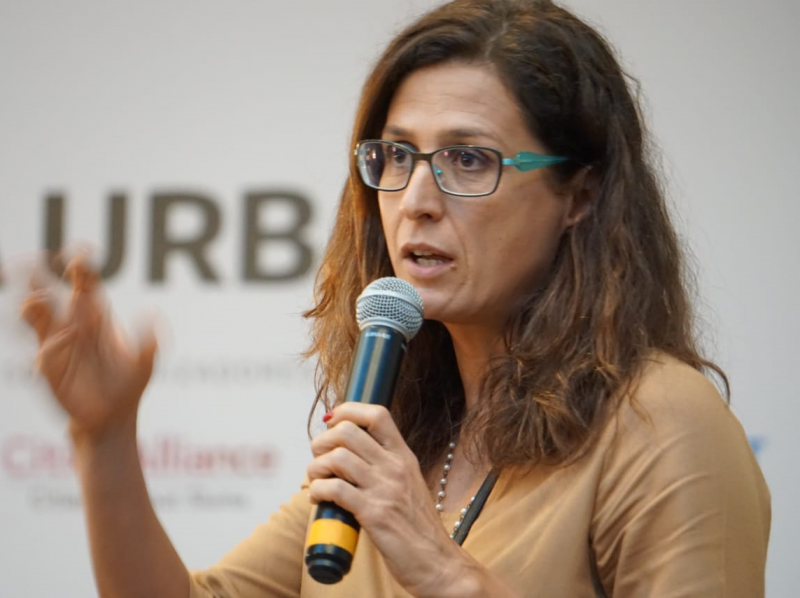By Anaclaudia Rossbach, Cities Alliance Regional Adviser for Latin America and the Caribbean
[22 July 2018] -- A historic gathering took place recently in Santo Domingo, capital of the Dominican Republic. The Latin American and Caribbean (LAC) Housing and Habitat Forum convened at a strategic moment in the implementation of a series of global commitments which, if not fulfilled urgently, will affect the lives of all of us living on this planet.
The Santo Domingo meeting was not business as usual. It was the culmination of a demanding two-year engagement co-led by the Cities Alliance Secretariat and our members, including Habitat for Humanity International, Chile’s Ministry of Housing and Urbanism (MINVU), UN-Habitat, the World Bank, and the Interamerican Development Bank, CAIXA, with strong support from strategic partners such as the Inter-American Housing Union (UNIAPRAVI).
During this period, a concept was constructed, partners mobilised, and resources leveraged. A key result of these efforts was the network called the Urban Housing Practitioner’s Hub, which brings together policy makers with housing practitioners on the ground. The Hub has a solid basis for operations for the next 2-4 years as a regional network, with potential to reach out and connect at the global level.
This Cities Alliance engagement in LAC not only aimed to place housing at the centre of the New Urban Agenda and the 2030 and Climate agendas, it pursued horizontality, participation, equity and gender balance, placing people at the centre and the Right to the City.
The whole LAC Housing and Habitat Forum was designed accordingly, with the intention of generating and promoting learning exchanges, as well as building consensus and critical mass around topics deemed critical for further development in the form of research: policy analysis, advocacy and experiences on the ground, collectively designing the way forward in the region.
Together with the important leadership and support of our partners – especially Habitat for Humanity, which assumed all operational responsibilities for the Forum – Cities Alliance played a critical role by fostering partnership and coalitions among our members, grantees and strategic regional allies. Also, through our extensive network and legacy (especially in Brazil), we were able to coordinate the intensive work of taking stock of experiences and recent trajectories and trends related to housing in LAC.
To date, the most important achievement has been the high-level participation and attendance in Santo Domingo. A quick survey of the audience had several intriguing findings:
-- An equal participation of public, social, private and academic sectors;
-- Representation of all sub regions and some attendance from Europe and North America;
-- Heterogeneous professional background and expertise; and
-- A high concentration of people with years of experience and knowledge, but also newcomers in the field aiming to expand horizons and learn. This is the social capital of the UHPH platform.
In terms of content, the framework of the conference combined different modalities of debate, such as in-depth discussions through the housing laboratories, technical panels and policy dialogues. It offered the audience a structured format that allowed them to improve their understanding of what is really going on in LAC on the housing front – who the players are and where we are heading.
Participants discussed important topics including:
-- Understanding the limitations and potential of current public finance systems and opportunities to leverage private sector investments and finance;
-- State-of-the-art housing policies in contrast to urban legal, institutional and policy frameworks;
-- How we are managing (or not) our precarious and vulnerable settlements and territories;
-- Alternative housing models such as rentals;
-- How we are making use of vacant and underutilised spaces in our cities;
-- The limitation of housing and other sectorial policies in the absence of strong metropolitan management and governance models;
-- The urgency of mainstreaming housing and vulnerable territories into urban development and planning; and
-- The current and potential environmental impact of climate change on housing and the vulnerability of the poor and informal to natural disasters and risk situations.
Another unique and valuable component of the Forum was the fact that it showcased 29 concrete inspiring experiences related to housing in the region that took a central role in the debate. The inclusion of these inspiring practices was strategic. They not only generated optimism by giving concrete examples of solutions at hand, they also gave new players who usually don’t take part in regional or global gatherings a chance to shine. This element strengthened and brought some fresh air to the debate.
Although the event and the platform have a regional focus, after 50 years of urbanisation, LAC has too many lessons to share. It can’t stay silent. Also, it is time to overcome regional and cross-sectoral fragmentation in accessing urban knowledge. Only by improving understanding of our trajectory and context in a way that builds on the past but innovates towards a common vision of the future will we be able to muster the resources to fulfil the global commitments in our cities, which house and shelter over 80 per cent of our people.

Anaclaudia Rossbach at the launch of the
Urban Housing Practitioner’s Hub in Santo Domingo, Dominican Republic. Photo: Cities Alliance
After 50 years of urbanisation, LAC has too many lessons to share. It can’t stay silent.
Related Items:
Urban Housing Practitioner’s Hub Takes Centre Stage at the 3rd LAC Housing and Habitat Forum Housing Innovation in Latin America and the Caribbean




